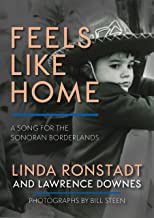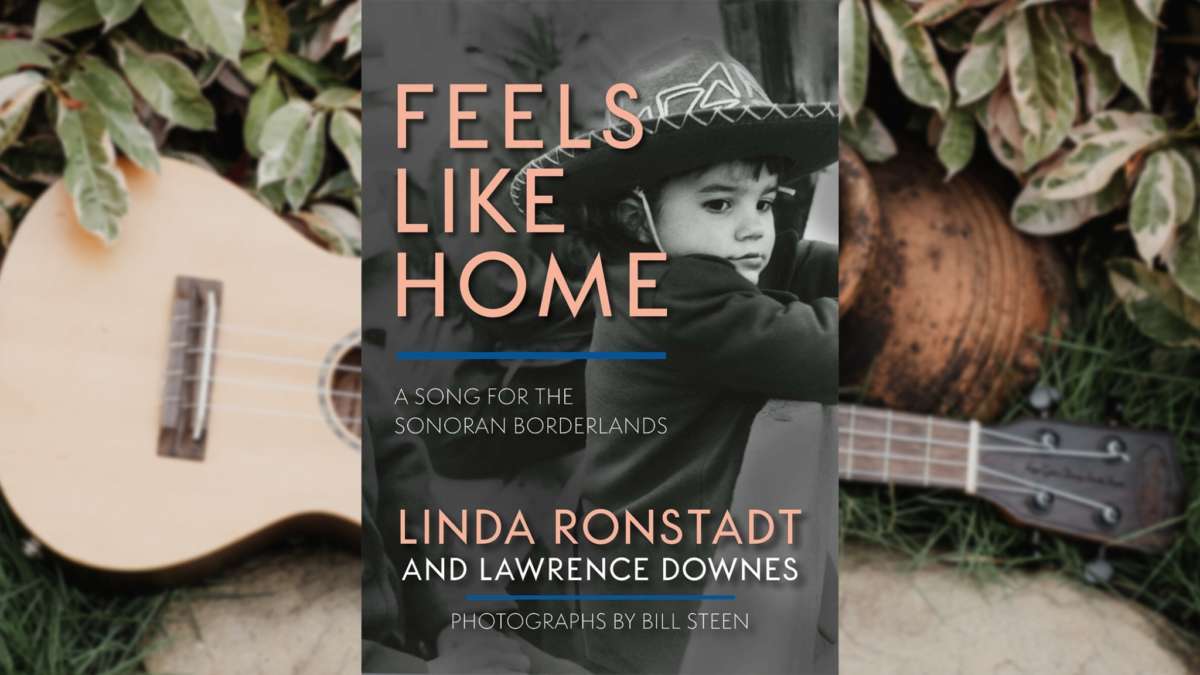Feels Like Home: A Song for the Sonoran Borderlands by Linda Ronstadt, Lawrence Downes
Linda Ronstadt’s latest offering began as a group cookbook. Thankfully, Feels Like Home: A Song for the Sonoran Borderlands (Heyday) morphed into a profoundly moving and visceral memoir and travelog, rooted in place, family heritage, history, and, yes, food.
Co-written with New York Times editor Lawrence Downes, Feels Like Home explores Ronstadt’s background long before she became a musical icon. Her phenomenal success in rock, traditional pop standards, Broadway operetta, and Mariachi touch the surface of her life; this book digs deep into the linkages that produced her rich body of work and, more importantly, shaped her identity.
Ronstadt’s immersion into her culture and family history opens a valuable vista into the Sonoran Borderlands, where the reader can learn about a little-known part of shared American and Mexican heritage.
A NON-TRADITIONAL MEMOIR
This book needs to be approached impartially, beginning with its structure. Rather than relying on the traditional narrative, Feels Like Home is a gathering of impressions and memories from Linda Ronstadt that highlight her personal life (including her strong opinions on immigration) rather than focus on her music career.
Music is at the story’s center; “It was my main means of expressing myself,” she said (see Q & A at the end of this review). But it is the shared music of a family and culture passed down through the generations — far away from Ronstadt’s “Queen of Rock” status with sold-out stadium shows and 100 million records sold. The Linda Rondstadt of Feels Like Home is far more compelling.
ADDRESSES IMMIGRATION AND HUMANITY
In telling her family’s story, Ronstadt addresses the broader and crucial issues surrounding immigration and the toxic political atmosphere that overshadows the humanity of the migrants. The Sonoran Borderlands is not just a place with a razor-wire fence dividing the United States and Mexico. It is home to people she has known and with whom she has grown up.
“The people from northern Mexico and the migrants at the border — wherever they are from — are pretty much the same as the rest of us, although they’ve been through a lot worse than we Americans have,” she stated. “They are good people just trying to live.”
By describing her family, friends, and ancestors through the common elements of food, music, culture, and the struggle to make a good life, Ronstadt adds a vital component to the discussion, reminding readers that immigration deals with flesh-and-blood people. Whether or not one agrees with Ronstadt’s stance, Feels Like Home challenges the reader to open the mind and heart to a more nuanced approach to the issue.
ENRICHED BY RONSTADT’S RECIPES AND MUSIC
Reading Feels Like Home is a tactile experience that employs the senses. It begins with its beautiful design as a smaller-size coffee table book, printed on fine, thick paper and filled with full-color family photographs and scenes from the Sonoran Borderlands.
Twenty recipes, arranged by theme and broken up into batches, follow various sections of the book. These recipes allow readers to experience something that Ronstadt thoroughly enjoys; it is a unique form of immersion into her story through the taste and aroma of food.
A bonus is the companion CD (sold separately) which includes songs Ronstadt sang with her family and friends and which influenced her oeuvre. Such sensual experiences invite the reader into a more profound understanding of Ronstadt’s account.
Ronstadt’s story offers something sorely lacking in modern life — connection. Her knowledge and understanding of her ancestors, where and how they lived, their culture, work, family life, food, and the songs they sang helped form her core. That core is reinforced and renewed through her current relationships that, no doubt, provide the strength she needs to live purposefully and with meaning despite her illness (Parkinson’s and progressive supranuclear palsy).
Downes writes, “She was always able to go home … again because that place and her people gave her a rock-solid identity she never lost.” Ronstadt adds, “With them, and all the musical Ronstadts, I am certain that the threads that connect us all are in no danger of breaking … the circle is unbroken, to steal a phrase. One of these days, and it won’t be long, we’ll rejoin them in a song. It’s the songs that keep us connected – that tell us who we are, where we came from, and maybe where we’re going … So I fall back on the music, the unbreakable chain of melody. It hasn’t failed us yet.”
Q & A WITH LINDA RONSTADT AND LAWRENCE DOWNES
What inspired you to write this book? It was initially supposed to be a cookbook — how did it morph into a memoir/love story/advocacy of the Sonoran borderlands?
I wanted to learn more about my Mexican great-grandmother, Margarita Redondo Ronstadt. She was a mystery to me — I knew her only from a few old photos and some stories told by my grandfather. There were some letters of hers that I had heard about but never read. I’d go back to the plaza of the Sonoran village where she lived and try to imagine what her life was like.
This book tries to turn that effort of imagination into something real and factual. As Lawrence and I did the research and writing, we unearthed so much about my family roots on both sides of the border and about the history and lore of the region — and the story grew.
Please describe how you pulled together your impressions, memories, and research regarding family and friends, food, music, and the borderlands to convey the story rather than relying upon a narrative.
Yes, you have it exactly right. We pulled together impressions, memories and research on all of those things, and put them between the covers of this book. It’s not a straight narrative, but it does tell a story — the story of a precious place, and the people and other creatures who live there.
What role has writing played in dealing with the difficult transitions in your life?
I have never really written much — and now I can’t even type! Singing was where I had the craft. It was my main means of expressing myself, and it’s hard to invent another one at age 76. But I wrote my memoir, Simple Dreams, entirely by myself, and Lawrence and I wrote Feels Like Home together. It was a wonderful experience to get it down in print and include Bill Steen’s beautiful photographs.
How has your heritage helped you maintain your sense of self despite your physical challenges?
My great-grandparents were strong, resilient people. They coped with a lot worse things than I have.
How did your grounding in your Mexican American identity help you during the heady period of your success in the 1970s?
I always told anyone who interviewed me that I was Mexican, and they would ignore it. They’d say, you have a German surname and you’re white. I knew who I was, even if most of the public didn’t. But then people figured it out. Singing Mexican songs was a way to honor the heritage that I got from my ancestors, and I loved sharing the music with other Mexican Americans. They would come to the mariachi shows and sing with me. They knew all the words.
Getting into opera and mariachi music was a bold return to your roots. How did that move strengthen you as a person? What did you learn from the experience?
It made me a better singer, because I had to learn to use different parts of my voice. It elevated my craftsmanship. After I did the mariachi records and the American Songbook with Nelson Riddle, I had a better instrument. The mariachi songs were the cherry on the cake.
What do you wish to achieve with Feels Like Home? What are you hoping readers take away from this book?
I want people to know that the Sonoran borderlands is one region, even though a fence runs through it. That the people from northern Mexico and the migrants at the border — wherever they are from — are pretty much the same as the rest of us, although they’ve been through a lot worse than we Americans have.
They are not the horrible threats that the razor-wire fence makes them out to be. They are good people just trying to live. So many are fleeing violence and poverty and are desperate for a safe haven in our rich country. And by refusing to help, by forcing little children and young mothers to migrate through the desert, we’re killing them.




